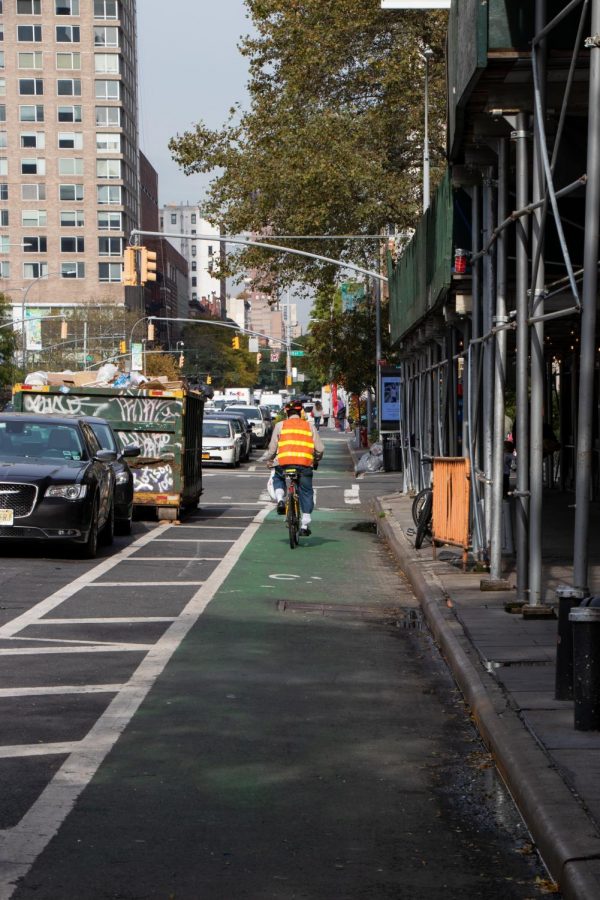New York’s War on Cars Paves On
ANDREW DRESSNER/THE OBSERVER
New York City is looking to remove free parking in Manhattan. Should New Yorkers roll with it?
January 22, 2020
If you drive in Manhattan, you know what it’s like: going in circles around the same five streets for an hour while waiting for that precious free spot to become available, patiently idling for the street sweeper to come by so you don’t get ticketed, never forgetting your bumper guard to protect your vehicle from nicks and dings.
It’s hard enough as it is to have a car in this city, you might think. But now, a cabal of anti-vehicular bureaucrats wants to do the unthinkable: Eliminate free parking altogether, exclusively reserving those rare street spots for holders of a residential parking permit.
Manhattan’s Community Board 7, whose jurisdiction spans most of the Upper West Side and often hosts its full board meetings here at Fordham’s Lincoln Center campus, recently passed a resolution urging the City Council to end free parking within its boundaries. Worrying that the city’s upcoming congestion pricing will bombard the Upper West Side with an influx of automobiles (since the pricing takes effect only below 60th Street in Manhattan), the resolution encouraged the Council to “consider more productive and equitable uses of curbside space,” such as implementing residential parking permits or parking permits “capable of surge pricing.”
The New York Times estimates that New York City has three million on-street parking spots, 95% of which are free. However, in the past decade, the city has been ramping up the installation of bike lanes which often remove travel and parking lanes alike. With a spike in the number of fatal pedestrian accidents last year, the city certainly feels an onus to take action. And while this resolution was a bit watered-down from an earlier and more resolute attempt last year to ban street parking, it’s no shock that many automobile owners feel singled-out.
Last month, a writer for Curbed NY, a real estate and blog network, made a notable argument for a permit parking system. While he promotes it as a panacea for the city’s woes, the system hardly holds up in practice. He starts off by acknowledging that the average annual income of New York City’s car owners was $85,000 — well over the city’s median annual income of $55,000 and in his mind able to cough up enough to pay for a permit or garage parking. This sounds like a good point, until you realize that New York is the most expensive city in the United States. A modest five-figure income hardly makes anyone well-off in this city.
Next, the author really wades into bizarre territory. He claims that the permit system could fund “a lot of park improvement plans.” Ah, yes, a city where the mayor’s wife wasted $850 million on a mental healthcare plan which has not produced any results can certainly be trusted to carefully allocate this money toward park improvement plans. Not to mention the fact that the community board didn’t even discuss where the money raised should go. Naiveté knows no bounds.
There are plenty of other issues surrounding the elimination of free public parking in Manhattan. You’d be kidding yourself to believe that the only people worthy of parking their cars for free in Manhattan would be residents. Although New York is the only major U.S. city not to have a residential parking permit system, New York is not like other major cities in the U.S. Perhaps a permit parking system would work in the outer boroughs like Queens or Staten Island, but even the most dimly lit parts of Manhattan are home to businesses that attract workers from out of the city and state. We shouldn’t be cutting off free parking to these individuals, many of whom probably would not be able to consistently afford the garage rates.
At the end of the day, a residential permit parking system would serve as another large check for a city whose annual budget is already higher than Florida’s, a state with twice the population. This city needs less money, not a penny more. Any pay-to-park system would do nothing but harass middle-income residents and non-residents alike, all while raising funds that only the most ingenuous among us suspect would be used for purposes that actually help New Yorkers.












Grace Jones-Roberts • Jul 9, 2022 at 8:13 pm
I own a home in Brooklyn and find it’s increasingly hard to find a parking spot. There are no garages and people own multiple cars or have tenants with multiple cars or both. Additionally, there are car businesses that park their cars illegally; out of state car owners; and people who’ve abandoned their cars. I have homeowners who illegally claim driveways when there is no actual ability to get a car through; illegal cutouts; and just people who use their side entrance to their garages for potted plants and garbage cans but will park their cars on the street! Tell me what do you think is fair?